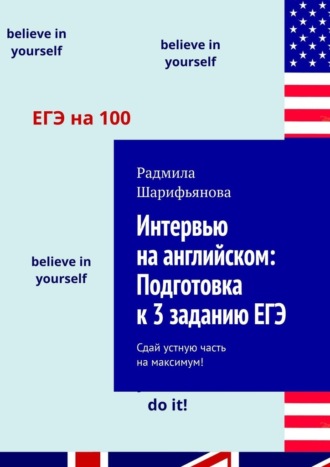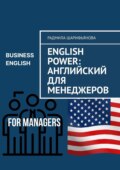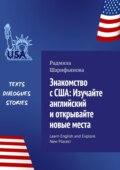
Радмила Шарифьянова
Интервью на английском: Подготовка к 3 заданию ЕГЭ. Сдай устную часть на максимум!
Sample answer
Interviewer: What types of hobbies do you enjoy doing that spark your creativity? Why do you find these hobbies helpful?
Student: I enjoy writing, drawing, and photography as hobbies that spark my creativity. These hobbies allow me to express myself in different ways and provide opportunities for experimentation and exploration. I find them helpful because they challenge me to think creatively and explore new ideas.
Interviewer: Can you describe how pursuing these hobbies has helped you tap into your creative side? Have you noticed any changes in your ability to think outside the box or come up with new ideas?
Student: Pursuing these hobbies has helped me tap into my creative side by providing avenues for self-expression and experimentation. By trying out new techniques or approaches, I have been able to expand my creative horizons and develop my skills. I have also noticed that engaging in creative hobbies has improved my ability to think outside the box and come up with new ideas, both within and outside of the hobbies themselves.
Interviewer: Do you think that hobbies can be used as a tool for enhancing creativity? Why or why not?
Student: Yes, I believe that hobbies can be used as a tool for enhancing creativity. Hobbies provide opportunities for individuals to experiment, take risks, and explore new ideas, which are all important aspects of cultivating creativity. Engaging in hobbies also provides an outlet for self-expression, which can help individuals develop their own unique creative voice.
Interviewer: Have you ever faced any challenges in pursuing a hobby that requires creativity? If so, how did you overcome these challenges?
Student: Yes, I have faced challenges in pursuing hobbies that require creativity. Sometimes, I find it difficult to come up with new ideas or feel stuck in a creative rut. To overcome these challenges, I try to take a break and step away from the hobby for a while, focusing on other activities or taking time for self-care. I also seek out inspiration from other sources such as books, movies or talking to others who share the same hobbies.
Interviewer: What advice would you give to someone who wants to explore hobbies that can enhance their creativity?
Student: My advice would be to start with hobbies that interest them and are aligned with their passions and talents. It’s important to approach hobbies with an open mind and a willingness to experiment and take risks. Don’t be afraid to try new things and make mistakes because this is part of the learning process. Be patient and persistent in pursuing hobbies because it takes time to develop creative skills. Finally, seek out inspiration from different sources and don’t hesitate to ask for feedback from others.
How hobbies can help with skill-building
Interviewer: Hello everybody! It’s Teenagers Round the World Channel. Our guest today is a teenager from Russia and we are going to discuss how hobbies can help with skill-building. We’d like to know our guest’s point of view on this issue. Please answer five questions. So, let’s get started.
Interviewer: What types of hobbies do you enjoy doing that have helped you develop new skills? Why do you find these hobbies helpful?
Student: _________________________
Interviewer: Can you describe how pursuing these hobbies has helped you develop these skills? Have you noticed any changes in your ability to perform certain tasks or tackle new challenges?
Student: _________________________
Interviewer: Do you think that hobbies can be used as a way to build new skills? Why or why not?
Student: _________________________
Interviewer: Have you ever faced any challenges in learning a new skill through a hobby? If so, how did you overcome these challenges?
Student: _________________________
Interviewer: What advice would you give to someone who wants to use their hobbies as a way to learn new skills?
Student: _________________________
Interviewer: Thank you very much for your interview.
Sample answer
Interviewer: What types of hobbies do you enjoy doing that have helped you develop new skills? Why do you find these hobbies helpful?
Student: Some examples of hobbies that can help in skill-building include playing musical instruments, painting, writing, coding, and sports. These hobbies can enhance creativity, problem-solving skills, hand-eye coordination, and teamwork abilities.
Interviewer: Can you describe how pursuing these hobbies has helped you develop these skills? Have you noticed any changes in your ability to perform certain tasks or tackle new challenges?
Student: Engaging in these hobbies involves practice, repetition, and patience. By continuously practicing, individuals can develop a sense of discipline and perseverance, which can be applied to other areas of their lives. As they become more skilled, they may notice improvements in their ability to perform certain tasks or tackle new challenges.
Interviewer: Do you think that hobbies can be used as a way to build new skills? Why or why not?
Student: Yes, hobbies can definitely be used as a way to build new skills. Hobbies are often chosen voluntarily, so individuals tend to be more motivated to develop their skills in these areas, as opposed to being forced to learn something. Hobbies also offer a low-pressure environment where individuals can experiment and make mistakes without fear of consequences. This can lead to a faster acquisition of new skills and increased confidence.
Interviewer: Have you ever faced any challenges in learning a new skill through a hobby? If so, how did you overcome these challenges?
Student: Learning a new skill through a hobby can be challenging, especially if it requires a steep learning curve. However, challenges should be viewed as opportunities for growth. To overcome these challenges, it is important to break the skill down into smaller, more manageable parts and to practice consistently. Seeking feedback from others who are more experienced can also be helpful.
Interviewer: What advice would you give to someone who wants to use their hobbies as a way to learn new skills?
Student: My advice would be to choose a hobby that is interesting and enjoyable. Learning should be fun and not feel like a chore. Setting goals and tracking progress can also help with motivation. Consistency is key, so it is important to set aside time each day or week to practice. Finally, don’t be afraid to make mistakes and seek feedback from others.
The importance of reading
Interviewer: Hello everybody! It’s Teenagers Round the World Channel. Our guest today is a teenager from Russia and we are going to discuss the importance of reading. We’d like to know our guest’s point of view on this issue. Please answer five questions. So, let’s get started.
Interviewer: Can you describe why you think reading is important for teenagers? What benefits can it bring?
Student: _________________________
Interviewer: What types of books do you enjoy reading? Why do you find these genres or authors interesting?
Student: _________________________
Interviewer: Do you think that reading can help with personal growth and self-improvement? How so?
Student: _________________________
Interviewer: Have you ever faced any challenges in finding time to read? If so, how did you overcome these challenges?
Student: _________________________
Interviewer: What advice would you give to someone who wants to start reading more but doesn’t know where to begin?
Student: _________________________
Interviewer: Thank you very much for your interview.
Sample answer
Interviewer: Can you describe why you think reading is important for teenagers? What benefits can it bring?
Student: As a teenager myself, I believe that reading is essential for personal growth, mental development, and expanding knowledge. Reading helps us learn new things, develop vocabulary, and improve our language skills. Moreover, it increases empathy, enhances creativity, and reduces stress. Books provide us with an insight into different cultures, perspectives, and experiences which ultimately broadens our understanding of the world.
Interviewer: What types of books do you enjoy reading? Why do you find these genres or authors interesting?
Student: Personally, I enjoy reading science fiction, fantasy and historical fiction. These genres allow me to escape reality and immerse myself in different worlds and settings. Authors such as J.K Rowling and George R.R. Martin have been my favorites because of their ability to create complex and relatable characters and storylines.
Interviewer: Do you think that reading can help with personal growth and self-improvement? How so?
Student: Absolutely! Reading can help individuals develop critical thinking skills, emotional intelligence, and self-awareness. By reading books on personal growth and self-improvement, one can learn new strategies for handling difficult situations, build resilience and develop healthy habits. Reading also helps individuals to gain a broader perspective on various aspects of life, relationships, work, and other areas that can contribute to personal growth.
Interviewer: Have you ever faced any challenges in finding time to read? If so, how did you overcome these challenges?
Student: Yes, finding time to read can be challenging especially when there are other school assignments and extracurricular activities. However, I try to create a schedule or set aside specific times during the day for reading. Sometimes, I opt to listen to audiobooks while doing other tasks such as cleaning, exercising, or traveling.
Interviewer: What advice would you give to someone who wants to start reading more but doesn’t know where to begin?
Student: My advice would be to start by choosing books on topics that they are interested in or genres that resonate with them. They can also join book clubs or participate in online reading challenges to keep themselves motivated and accountable. Additionally, setting achievable goals such as reading for 15 minutes per day can help make reading a habit. Finally, it’s essential to remember that reading should be enjoyable, so don’t pressure yourself to finish a book if you’re not enjoying it.
The impact of literature on society
Interviewer: Hello everybody! It’s Teenagers Round the World Channel. Our guest today is a teenager from Russia and we are going to discuss the impact of literature on society. We’d like to know our guest’s point of view on this issue. Please answer five questions. So, let’s get started.
Interviewer: Can you describe how you think literature can influence society? What role does it play in shaping cultural attitudes and beliefs?
Student: _________________________
Interviewer: What types of books do you think have had a significant impact on society or culture? Why do you think these works are important?
Student: _________________________
Interviewer: Do you think that literature has the power to change the world? Why or why not?
Student: _________________________
Interviewer: Have you ever read a book that challenged your worldview or made you see things from a different perspective? If so, can you describe your experience?
Student: _________________________
Interviewer: What advice would you give to someone who wants to become a more informed and engaged reader in terms of societal issues?
Student: _________________________
Interviewer: Thank you very much for your interview.
Sample answer
Interviewer: Can you describe how you think literature can influence society? What role does it play in shaping cultural attitudes and beliefs?
Student: Literature has the power to shape cultural attitudes and beliefs by exploring and exposing societal issues through characters and stories. Books such as «Crime and Punishment» by Fyodor Dostoevsky can challenge readers to reflect deeply on their own morality and values, thereby changing how they view themselves and the world around them.
Interviewer: What types of books do you think have had a significant impact on society or culture? Why do you think these works are important?
Student: I believe that books that address social justice issues such as racism, sexism, and inequality have had a significant impact on society. Examples include «To Kill a Mockingbird» by Harper Lee, «The Color Purple» by Alice Walker, and «Crime and Punishment» by Fyodor Dostoevsky. These books are important because they bring attention to important issues and inspire readers to take action for positive change.
Interviewer: Do you think that literature has the power to change the world? Why or why not?
Student: Yes, I strongly believe that literature can change the world. By reflecting on important societal issues and presenting different perspectives, literature has the potential to inspire people to take action and make positive changes in society. Books can provide hope, educate, and help people empathize with others who may be different from themselves.
Interviewer: Have you ever read a book that challenged your worldview or made you see things from a different perspective? If so, can you describe your experience?
Student: Yes, «Crime and Punishment» by Fyodor Dostoevsky challenged my worldview and made me see things from a different perspective. The book explores the theme of morality and guilt through the character Raskolnikov, who commits a murder and is tormented by his conscience. Reading this novel made me reflect on my own values and beliefs about right and wrong.
Interviewer: What advice would you give to someone who wants to become a more informed and engaged reader in terms of societal issues?
Student: My advice would be to read widely and diversely, including books that address important societal issues. It’s also important to engage in meaningful discussions with others, both online and in person, to gain different perspectives and deepen one’s understanding of these issues. Lastly, taking action to support causes related to these issues is crucial in creating positive change in society.
The importance of diversity in literature
Interviewer: Hello everybody! It’s Teenagers Round the World Channel. Our guest today is a teenager from Russia and we are going to discuss the importance of diversity in literature. We’d like to know our guest’s point of view on this issue. Please answer five questions. So, let’s get started.
Interviewer: Can you describe why you think it’s important for books to have diverse characters and representation? How can this help readers relate to different perspectives?
Student: _________________________
Interviewer: What types of books do you think do a good job of representing diverse voices? Why do you find these works impactful?
Student: _________________________
Interviewer: Do you think that reading books with diverse characters or perspectives can help reduce stereotypes and prejudice? How so?
Student: _________________________
Interviewer: Have you ever read a book that opened your eyes to a different culture or way of life? If so, can you describe your experience?
Student: _________________________
Interviewer: What advice would you give to authors who want to write more diverse stories? How can they approach this topic authentically and respectfully?
Student: _________________________
Interviewer: Thank you very much for your interview.
Sample answer
Interviewer: Can you describe why you think it’s important for books to have diverse characters and representation? How can this help readers relate to different perspectives?
Student: I believe that it’s important for books to have diverse characters and representation because it allows readers to see themselves or people like them in literature. Additionally, exposure to diverse characters and perspectives can broaden readers’ knowledge and empathy towards others, ultimately leading to a more accepting and inclusive society.
Interviewer: What types of books do you think do a good job of representing diverse voices? Why do you find these works impactful?
Student: I think that books written by authors from diverse backgrounds and experiences tend to do a good job of representing diverse voices. These works are often impactful because they provide representation for marginalized groups and expose readers to stories and perspectives that may not have been heard before.
Interviewer: Do you think that reading books with diverse characters or perspectives can help reduce stereotypes and prejudice? How so?
Student: Yes, I definitely think that reading books with diverse characters or perspectives can help reduce stereotypes and prejudice. When we read about people from different backgrounds and cultures, it humanizes them and breaks down preconceived notions we may have had before. This can help us see people as individuals rather than just members of a group, and ultimately lead to greater empathy and understanding.
Interviewer: Have you ever read a book that opened your eyes to a different culture or way of life? If so, can you describe your experience?
Student: Yes, I have read a book called «Quiet Flows the Don» by Mikhail Sholokhov, which explores the lives and struggles of Cossacks during the early 20th century. This book exposed me to a way of life and culture that I was not familiar with before, and helped me better understand the history and traditions of the Cossack people.
Interviewer: What advice would you give to authors who want to write more diverse stories? How can they approach this topic authentically and respectfully?
Student: My advice to authors who want to write more diverse stories is to do their research and consult with people from the communities they are writing about. It’s important to approach this topic authentically and respectfully by avoiding stereotypes and tropes and instead focusing on creating complex and nuanced characters. Additionally, it’s crucial to recognize that representation is not a one-size-fits-all solution, and different groups may have different needs and perspectives when it comes to representation.
Sample answer
Interviewer: Hello everybody! It’s Teenagers Round the World Channel. Our guest today is a teenager from Russia and we are going to discuss the impact of technology on reading. We’d like to know our guest’s point of view on this issue. Please answer five questions. So, let’s get started.
Interviewer: How has technology impacted your reading habits? Do you prefer physical books or e-books? Why?
Student: _________________________
Interviewer: Do you think that the rise of technology has had a positive or negative impact on reading as a whole? Why?
Student: _________________________
Interviewer: How do you think advancements in technology will continue to shape the future of reading and literature?
Student: _________________________
Interviewer: Have you ever used any online reading resources, such as audiobooks or online book clubs? If so, can you describe your experience?
Student: _________________________
Interviewer: What advice would you give to someone who wants to balance their use of technology with their love for reading?
Student: _________________________
Interviewer: Thank you very much for your interview.
The role of reading in education
Interviewer: Hello everybody! It’s Teenagers Round the World Channel. Our guest today is a teenager from Russia and we are going to discuss the role of reading in education. We’d like to know our guest’s point of view on this issue. Please answer five questions. So, let’s get started.
Interviewer: How has reading impacted your academic performance? In what ways has it helped you succeed in school?
Student: _________________________
Interviewer: Do you think that reading is an important part of education? How can schools encourage students to read more?
Student: _________________________
Interviewer: How do you think reading can help students develop critical thinking and analytical skills? Can you give any examples?
Student: _________________________
Interviewer: Have you ever been assigned a book for school that you didn’t enjoy reading? If so, how did you approach the task of reading it?
Student: _________________________
Interviewer: What advice would you give to someone who wants to improve their reading skills for academic purposes?
Student: _________________________







